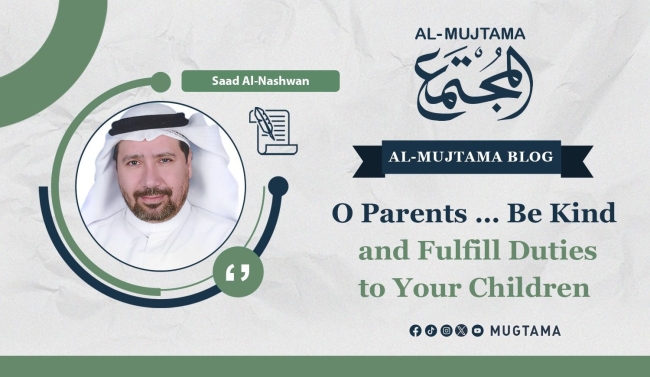O Parents… Be Kind and Fulfill Duties to Your Children
The title of this article may seem reversed, but it is intentional. Usually, children are expected to be dutiful their parents, a message frequently conveyed in Friday sermons, mosque lessons, and educational programs on television and radio. However, it is rare to hear demands for parents to be dutiful to their children.
Here, we do not mean material care—providing food, clothing, and life necessities—but rather moral and value-based care. Parents should nurture their children's values just as they ensure their nourishment.
Our role model, Prophet Muhammad (peace and blessings be upon him), exemplified this when he said to Abdullah ibn Abbas: "O boy! I will instruct you in some matters. Be watchful of Allah (Commandments of Allah), He will preserve you. Safeguard His Rights, He will be ever with you. If you beg, beg of Him Alone; and if you need assistance, supplicate to Allah Alone for help. And remember that if all the people gather to benefit you, they will not be able to benefit you except that which Allah had foreordained (for you); and if all of them gather to do harm to you, they will not be able to afflict you with anything other than that which Allah had pre-destined against you. The pens had been lifted and the ink had dried up."
With these words, the Prophet (peace and blessings be upon him) instilled firm faith, fear of Allah, and a sense of accountability in the heart of this young boy.
Similarly, the companion Umar ibn Abi Salamah (may Allah be pleased with him) narrated: "I was a young boy under the care of the Messenger of Allah (peace and blessings be upon him), and my hand used to roam around the plate. So the Messenger of Allah (peace and blessings be upon him) said to me: ‘Dear child, mention Allah's Name, eat with your right hand, and eat from what is next to you."
These hadiths highlight the importance of proper upbringing beyond merely providing food and drink.
Parental duty toward children is not just about words but also about setting a good example. This includes allowing children to accompany their parents to gatherings and social events. As the saying goes, “Gatherings are schools.” A child learns when to speak, how to sit, and when to leave. Likewise, a daughter accompanying her mother to women’s gatherings learns modesty, appropriate conversation, and other essential aspects of womanhood.
Parents are the mirror of their children. As the poet Al-Ma'arri said: "A young boy grows up according to what his father accustomed him to,
And his close ones shape his religious devotion, not his own reasoning."
Similarly, the saying “Education in childhood is like engraving on stone” emphasizes that early teachings remain ingrained in a child's memory for life.
Children are like empty vessels. If left to social media and electronic games under the pretext of parental busyness—especially during family visits—the consequences can be harmful. Instead, children should be encouraged to play and interact with their peers from family and neighbors. The moral and health risks of excessive exposure to electronic games are well-known.
One of the greatest parental failings is leaving children in the care of nannies, whether Muslim or non-Muslim, without knowing what values they are instilling. Surveillance cameras are not enough to monitor domestic workers or drivers. I recall an incident during my time as a teacher when a parent approached me, requesting that his son pass the Arabic language course despite his extreme weakness in the subject. When I asked who was tutoring the child at home, I was shocked by the father’s response: their housemaid, an Asian worker, was the one teaching him! I immediately declined to continue the conversation, and the boy did not pass the course.
If we want our children to honor us, we must first instill in them strong values, religious principles, and moral foundations, beginning with choosing a righteous mother to raise them properly.
-------------------------------------------------------------


